.

4-H Club girls at 4-H Camp: photographer unknown for U.S. Department of the Interior, Bureau of Indian Affairs, Standing Rock Agency, 1931 (National Archives and Records Administration)
I am the girl of Voss
watching the Indian girls
of the 4-H Club at play
saving up
for the time
when I will run
as they do
over the dusty ground
with pants
and not checking the clouds
and not looking for
my reindeer
or where commas may
go or not go
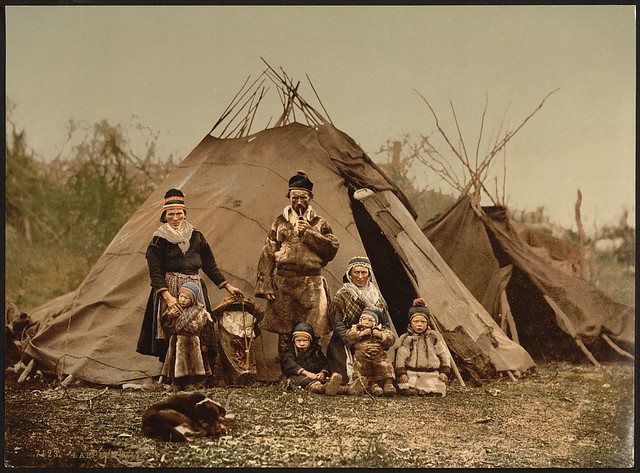
A Lapp family, Norway, c. 1890: photochrome print, Detroit Publishing Co., 1905 (Library of Congress)

Ben Defender Jr with the Alta corn he grew in Kenel District [South Dakota]: photographer unknown for U.S. Department of the Interior, Bureau of Indian Affairs, Standing Rock Agency, 1930 (National Archives and Records Administration)
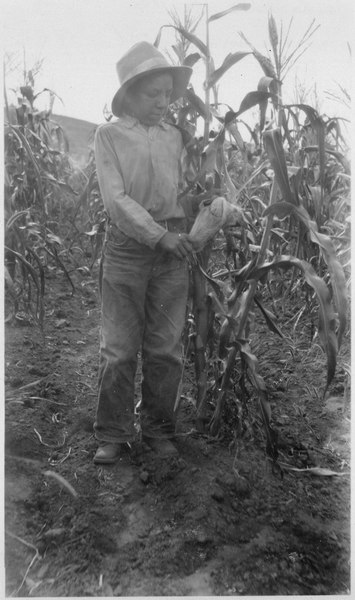
Jacob Jordan in his 4-H cornfield: photographer unknown for U.S. Department of the Interior, Bureau of Indian Affairs, Standing Rock Agency, 1930 (National Archives and Records Administration)

Baseball game at the Standing Rock Fair: photographer unknown for U.S. Department of the Interior, Bureau of Indian Affairs, Standing Rock Agency, c. 1935 (National Archives and Records Administration)
Baseball game in progress, Standing Rock Agency: photographer unknown for U.S. Department of the Interior, Bureau of Indian Affairs, Standing Rock Agency, c. 1940 (National Archives and Records Administration)
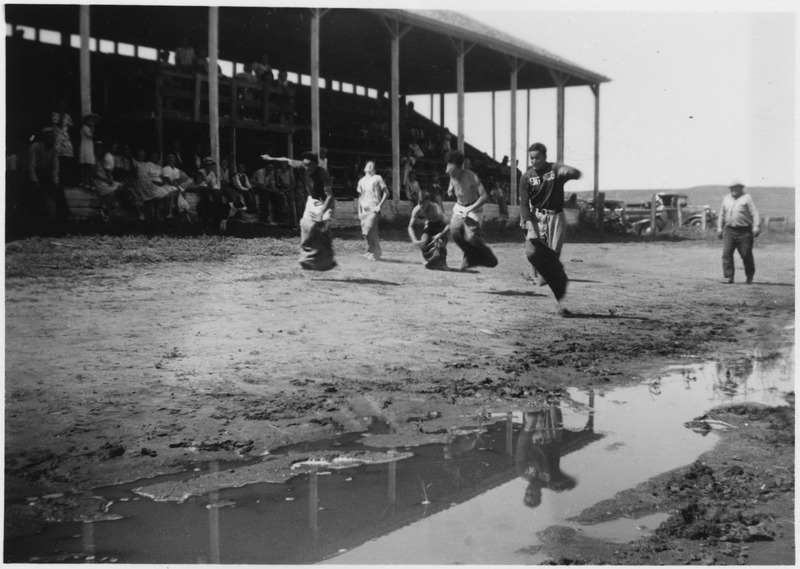
Sack race following the rain: photographer unknown for U.S. Department of the Interior, Bureau of Indian Affairs, Standing Rock Agency, 1939 (National Archives and Records Administration)

Baseball player in the batting circle: photographer unknown for U.S. Department of the Interior, Bureau of Indian Affairs, Standing Rock Agency, c. 1940 (National Archives and Records Administration)

Basketball team: photographer unknown for U.S. Department of the Interior, Bureau of Indian Affairs, Standing Rock Agency, 1940 (National Archives and Records Administration)
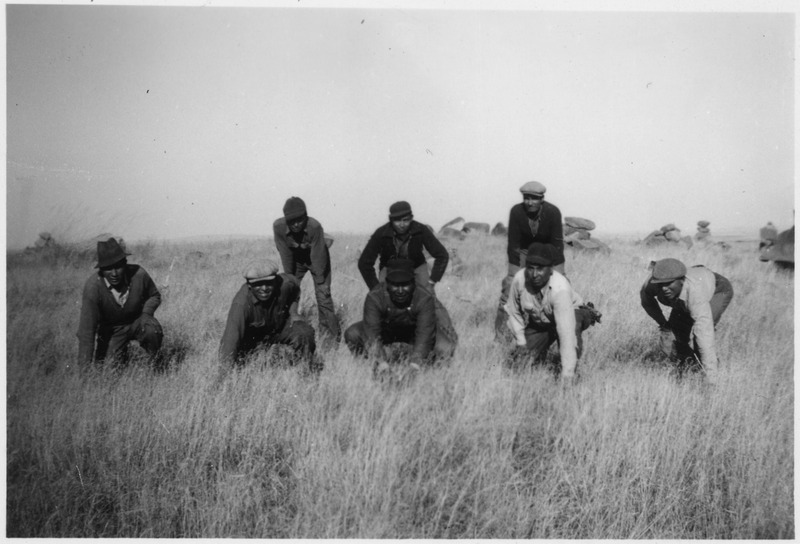
Football squad from Project 182: photographer unknown for U.S. Department of the Interior, Bureau of Indian Affairs, Standing Rock Agency, 1938 (National Archives and Records Administration)

Big Head Tribal Council meeting group: photographer unknown for U.S. Department of the Interior, Bureau of Indian Affairs, Standing Rock Agency, 1932 (National Archives and Records Administration)
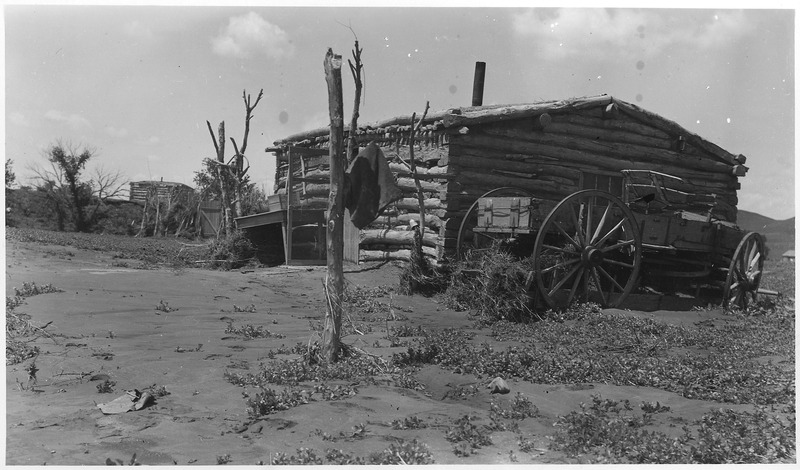
Log cabin with wagon parked beside it. A stark study in Plains Indian dwellings: photographer unknown for U.S. Department of the Interior, Bureau of Indian Affairs, Standing Rock Agency, c. 1938 (National Archives and Records Administration)

Log house with a sod roof: photographer unknown for U.S. Department of the Interior, Bureau of Indian Affairs, Standing Rock Agency, c. 1939 (National Archives and Records Administration)

Women and child in front of cabin made of what appears to be scrap lumber: photographer unknown for U.S. Department of the Interior, Bureau of Indian Affairs, Standing Rock Agency, 1938 (National Archives and Records Administration)

Camp tents in the winter: photographer unknown for U.S. Department of the Interior, Bureau of Indian Affairs, Standing Rock Agency, c. 1938 (National Archives and Records Administration)

Family camp near Kenel, South Dakota: photographer unknown for U.S. Department of the Interior, Bureau of Indian Affairs, Standing Rock Agency, 1939 (National Archives and Records Administration)

Two Indian Children. They sit in front of a cabin door; the little girl is crying: photographer unknown for U.S. Department of the Interior, Bureau of Indian Affairs, Standing Rock Agency, c. 1939 (National Archives and Records Administration)

Telephone maintenance lineman: photographer unknown for U.S. Department of the Interior, Bureau of Indian Affairs, Standing Rock Agency, c.1935 (National Archives and Records Administration)
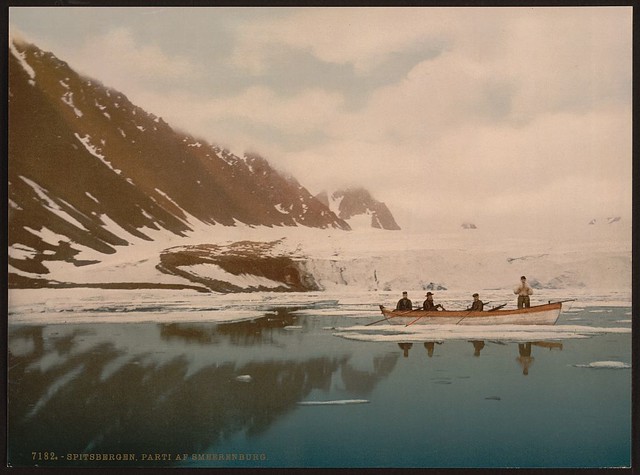
View of Smeerenburg, Spitzbergen, Norway, c. 1890: photochrome print, Detroit Publishing Co., 1905 (Library of Congress)
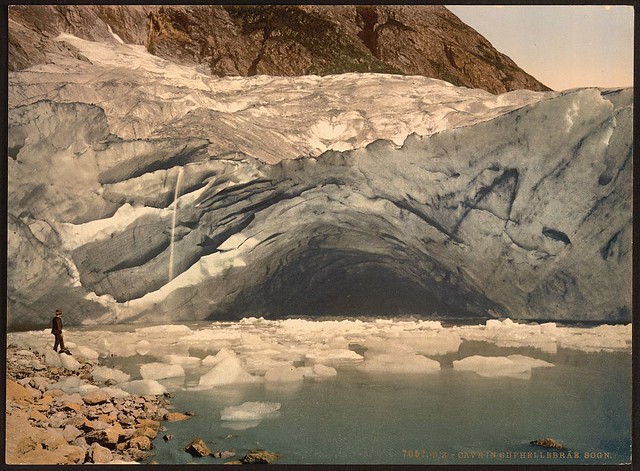
Grotto in Suphellebrae, Sognefjord, Norway, c. 1890: photochrome print, Detroit Publishing Co., 1905 (Library of Congress)
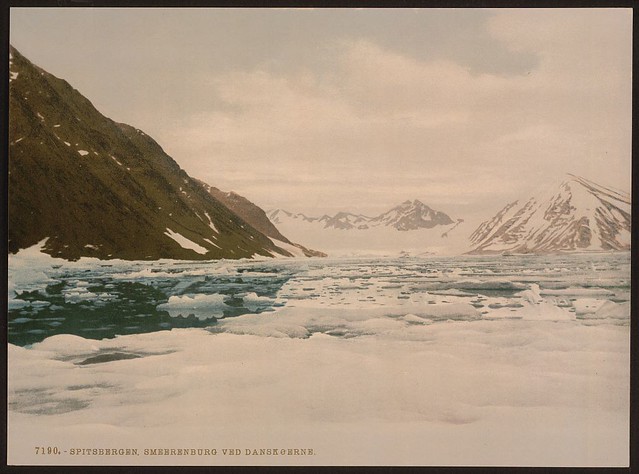
Smeerenburg at Danskerne, Spitzbergen, Norway, c. 1890: photochrome print, Detroit Publishing Co., 1905 (Library of Congress)
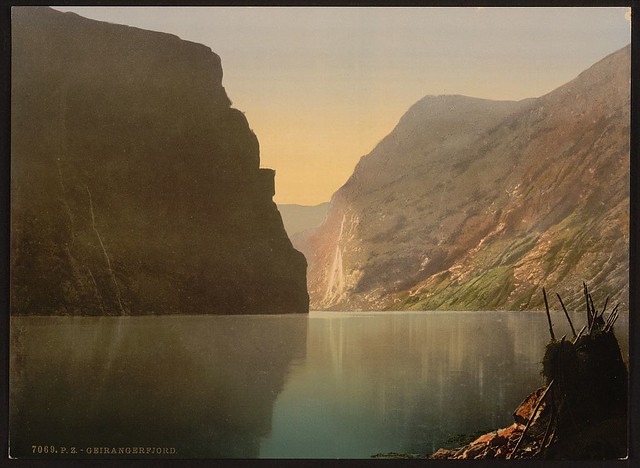
Praekestolen, Geiranger Fjord, Norway, c. 1890: photochrome print, Detroit Publishing Co., 1905 (Library of Congress)
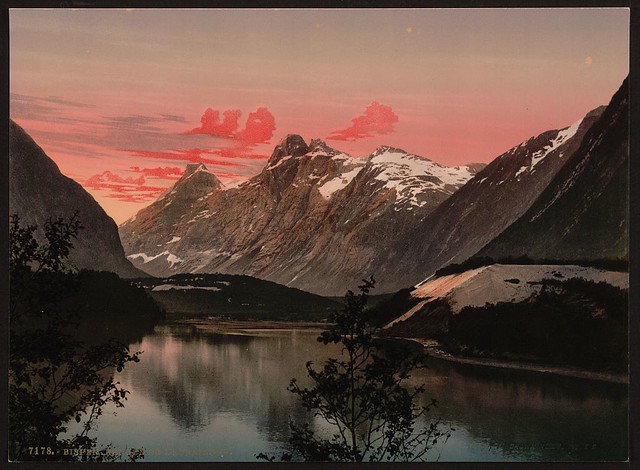
Kongen og Dronningen, Bispen, Norway, c. 1890: photochrome print, Detroit Publishing Co., 1905 (Library of Congress)
You may ask why it is that scenes from the Old Country by the Fjords should be running through the mind of the girl of Voss on the day of the 4-H Club Fair at Standing Rock Agency. A Fair question. Can it be that, so far from home, she does not really feel so far away after all? Or that, on the other hand, while not actually so far away in a literal sense, in another deeper sense she yet feels more remote than ever from that impossible past, and closer than ever before to being able to touch those dreams which have always been running away from her, like swiftly drifting and melting ice floes, or bits of dry grass tossed high in the air and blown off on the high plains wind?

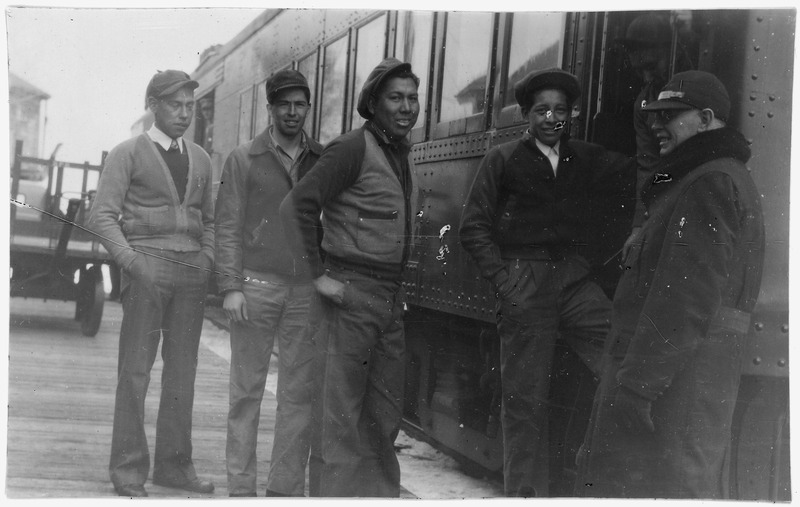
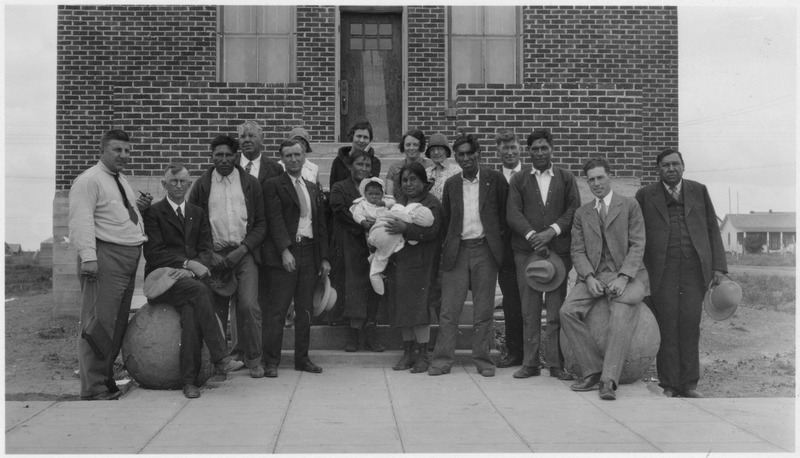
The explanation makes perfect sense.
ReplyDeleteBeautiful series of images.
Very much like the poem.
Tom,
ReplyDeleteFrom Norway to the Standing Rock Agency and back to Norway -- a beautiful arrangement of photos (to go with Susan's poem, "that impossible past" now here, the "matter at hand". . .
6.27
light coming into sky above still black
ridge, bird flapping toward pine branch
in foreground, sound of wave in channel
matter at hand, to act upon
translated by “action”
the word, others looking at
that, now less spoken
silver of sunlight reflected in channel,
white cloud in pale blue sky on horizon
Many thanks, Jonathan and Steve.
ReplyDeleteWhen viewed from a tent made of skins and sticks by the light of the midnight sun, everything about the girl of Voss suddenly seems to make perfect sense, in a stopped-time heartbeat in the midst of the continuum sort of way.
The Green Clover
ReplyDeleteNevada was a greenish desert with Walker River
running through it. No one was ever in sight.
I tried to cut my wrists with a butter knife
and a pop can pull tab from Diet Pepsi. I had
a big cut from knee-walking practice over the wide
shag carpet. My right knee found a chip of ceramic
from off my mushroom piggy bank. We moved to Reno later.
My autograph book had signatures written in cursive on the lime green paper that was printed with four leaf clovers.
According to 4-H, the clover stood for head, heart, hands, and home.
It was tacked with small stitches onto my jacket when I went to Show.
None are ever in sight. The solitude drives youth into sullen moods, consoled only by their cattle.
ReplyDeleteBoys judging prize heifers at 4-H Club Fair at Charleston, W. Va, October 1921
The reindeer were not that easy
ReplyDeleteto control
I needed my dogs
and of course Father
who was always gone
fishing somewhere
our lives, poetic
but now
I have a purpose
there is my dream
I go to
the crimson cloud
with its own wind
a planet forming
I'll name it Voss
so I'll know it
always even when
I'm old and say
I've forgotten
4-H or not
forgotten it
“None are ever in sight. The solitude drives youth into sullen moods, consoled only by their cattle.” cf. Basketball team: photographer unknown.
ReplyDeleteWow, Susan, this is great!
ReplyDeleteWe should all ditch the commas and the obligatory looking and run where the laughter takes us.
ReplyDeleteThanks, Susan. As we have it down our way, this is BOSTIN'.
Commas are so last year.
ReplyDeleteparadise lost!
ReplyDeleteSuch a fine revelation.
ReplyDeleteLove the poems, Susan! Thanks, Tom, for so beautifully facilitating their exposure! The girl of Voss has found her match. Her matches.
ReplyDeleteI'll guess I'll just stick to parentheses in my future longings for Voss.
ReplyDeleteBlog Writer People--Thanks so much for your comments on this and every post to read throughout Tom Clark's blog.
ReplyDeleteThanks for putting things into words, Tom Clark, and helping me find the strays.
The pleasure and the privilege, all ours, Susan.
ReplyDelete(And by the by, Susan, you'll perhaps be interested to know that this post has occupied the work time of the Bureau of Indian Affairs, Department of the Interior. Just proving that the pants were a fine idea.)
ReplyDelete(Just thought we needed a parenthesis there.)